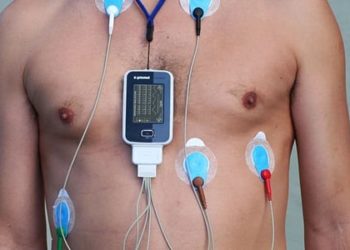Patient Basics: Holter Monitor and Event Monitor
Originally published by Harvard Health.
What is the test?
A Holter monitor is a portable EKG device that records your heart rhythm over time, outside the hospital or doctor’s office. Whereas a regular EKG examines your heart’s electrical activity for a few seconds, the Holter monitor examines changes over a sustained period of time-usually a 24- to 48-hour period-while you go about your daily activities and even while you sleep. One type of Holter monitor, called an “event monitor,” can be used to record rhythms over a longer time, such as a 30-day period. Doctors use Holter monitor or event monitor tests to evaluate symptoms that come and go and that might be related to heart-rhythm changes or coronary artery disease.
How do I prepare for the test?
Men with a lot of hair on their chest will probably have to shave it. Otherwise, there’s no special preparation.
What happens when the test is performed?
A technician in your doctor’s office or a diagnostic lab fits you with a Holter monitor and explains how to use it. Five stickers are attached to your chest. Wires snap onto each of these stickers and connect them to the monitor. The wires detect your heart’s electrical pattern throughout the day, while the monitor records and stores the data for doctors to interpret later. You can fit the monitor into a purse or jacket pocket or wear it over your shoulder by its strap.
You can go about your normal activities with two exceptions. First, you can’t take a shower or bath during the period that you’re wearing the monitor. Second, you are given a small diary in which to note any worrisome symptoms you feel and record the time when they occur. The doctor will later review both your diary and the data about your heart’s activity from the monitor, to see if any symptoms you experienced were caused by some underlying heart problem. There are no side effects from the testing.
For an event monitor, you wear a recording device for a much longer period of time (this could be for several weeks or a month). The device only uses two wires, instead of five, and it can be removed for bathing. The device records your heart rhythm throughout the test, but it only saves its recordings at times when you activate the device to do so. This allows you to capture on record the heart rhythm patterns that you feel when you have symptoms. When you activate the device to store data, it will store data that was temporarily recorded during the 30 seconds prior to your press of the button, as well as for 30 seconds going forward.
If you have activated your event monitor device one or more times, the data can be transmitted to a cardiology lab through the telephone. You will be given clear instructions about what number to call to transmit your recordings, and how and when to trigger the device to play tones into your telephone, which are translated by a computer at the lab into a readable EKG tracing. Transmitting each recording allows it to be reviewed while the test is in progress, in case your heart condition needs immediate attention.
What risks are there from the test?
There are no risks.
Must I do anything special after the test is over?
You need only return the Holter monitor or event monitor. Sometimes this can be done through the mail.
How long is it before the result of the test is known?
It usually takes a few days for your recording to be printed out and examined.





